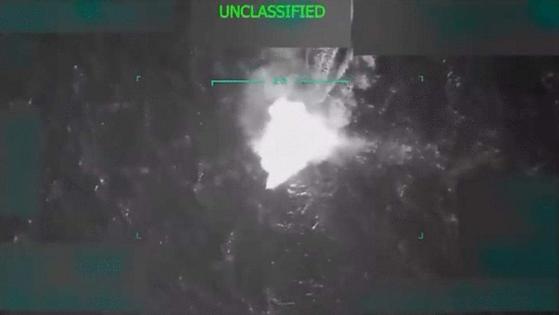US forces in Caribbean sink a fifth suspected drug vessel off Venezuelan coast
Published in News & Features
The Trump administration escalated its campaign against Venezuelan drug cartels on Friday, announcing a U.S. military strike that destroyed another alleged narco-trafficking vessel off the coast of the South American nation. According to Pentagon officials, four men aboard the boat were killed, and a significant shipment of narcotics was prevented from reaching the United States.
Defense Secretary Pete Hegseth confirmed the operation in a message posted to his X account, describing it as a “lethal, kinetic strike” carried out under President Donald Trump’s direct orders. Officials said the target was a vessel tied to groups Washington has designated as terrorist organizations.
The post also included a video showing aerial footage of a fast-moving boat at sea that suddenly explodes. So far, five boats believed to be carrying drugs have been intercepted in the Caribbean, with the death toll now rising to 21.
“Earlier this morning, on President Trump’s orders, I directed a lethal, kinetic strike on a narco-trafficking vessel affiliated with Designated Terrorist Organizations in the USSOUTHCOM area of responsibility,” Hegseth said. “Four male narco-terrorists aboard the vessel were killed in the strike, and no U.S. forces were harmed in the operation. The strike was conducted in international waters just off the coast of Venezuela while the vessel was transporting substantial amounts of narcotics — headed to America to poison our people.”
Hegseth emphasized that U.S. intelligence provided unequivocal confirmation that the vessel was engaged in drug trafficking. He vowed that operations would continue.
“These strikes will continue until the attacks on the American people are over,” he said.
The strike marks the latest move in a campaign that U.S. officials say targets drug trafficking networks with deep ties to the Venezuelan government. U.S. intelligence agencies have long alleged that elements of the Maduro regime are embedded within the so-called Cartel de los Soles, which is accused of overseeing large-scale cocaine shipments from Venezuela to markets in North America and Europe.
Friday’s strike came a day after the administration justified its previous strikes in a memo to lawmakers, some of whom have expressed concerns about an overreach of executive power. In its memo to Congress, the administration declared drug cartels to be “unlawful combatants” and informed lawmakers the United States is in an “non-international armed conflict” with them.
The strikes, which began early last month, followed the administration’s launch of the largest U.S. military deployment in the Caribbean in decades, aimed at disrupting drug operations in the region. The initial phase of the deployment includes a Marine air-ground task force aboard the amphibious assault ship USS Iwo Jima and two San Antonio-class transport ships, with more than 2,000 Marines prepared for rapid-response missions.
In total, more than 4,500 U.S. personnel — Marines and Navy — are operating in the region, supported by a cruiser, several destroyers, and a Los Angeles-class attack submarine armed with precision-guided missiles. Ten F-35 stealth fighters are also stationed in Puerto Rico, capable of easily outmatching Venezuela’s aging fleet of Sukhoi Su-30s and F-16s.
White House press secretary Karoline Leavitt defended the operation during her daily briefing, framing it as both a constitutional and moral obligation for the president.
“As the White House has said many times, the President has directed these actions — these strikes against Venezuelan drug cartels and their vessels — in accordance with his responsibility to protect U.S. interests abroad and to further American national security and foreign policy objectives,” Leavitt told reporters. “This is pursuant to his constitutional authority as commander-in-chief and chief executive to conduct foreign relations in each of these cases.”
Leavitt added that the intelligence community had confirmed the vessels’ ties to terrorist organizations and their role in the northward flow of narcotics. “The vessels have been assessed by the U.S. intelligence community to be affiliated with designated terrorist organizations and were actively trafficking illicit drugs to our country at the time of the strike,” she said.
The administration has increasingly fused the war on drugs with counterterrorism, describing cartels as “narco-terrorist” entities rather than merely criminal organizations. Officials argue that this framing grants Washington broader legal and military latitude to act against foreign groups involved in narcotics smuggling.
For Trump, the operation also ties directly into his domestic political narrative. On the campaign trail, he repeatedly promised to end the opioid crisis and the broader drug epidemic that he argues has devastated American communities. Leavitt said Friday’s strike demonstrated his commitment to that pledge.
“The President has been very clear — dating back to the campaign trail — that he will always do what is in the best interest of the American homeland,” she said. “He also promised the American people he would end the drug epidemic that has taken far too many American lives. You’re seeing those actions play out almost every single day.”
The Venezuelan government has not yet issued a public response to the strike, though Caracas has previously condemned similar U.S. operations as violations of its sovereignty.
©2025 Miami Herald. Visit miamiherald.com. Distributed by Tribune Content Agency, LLC.







Comments